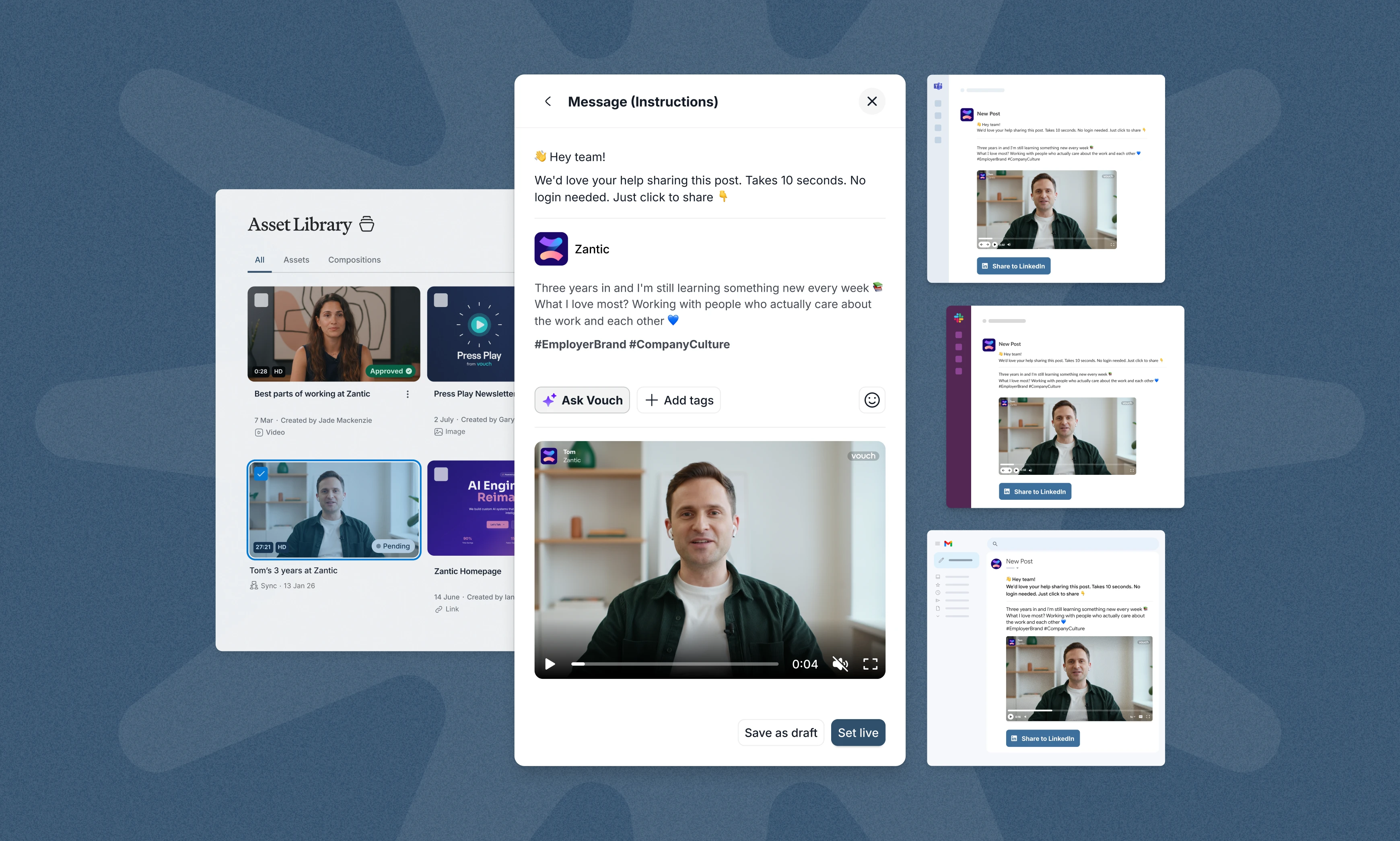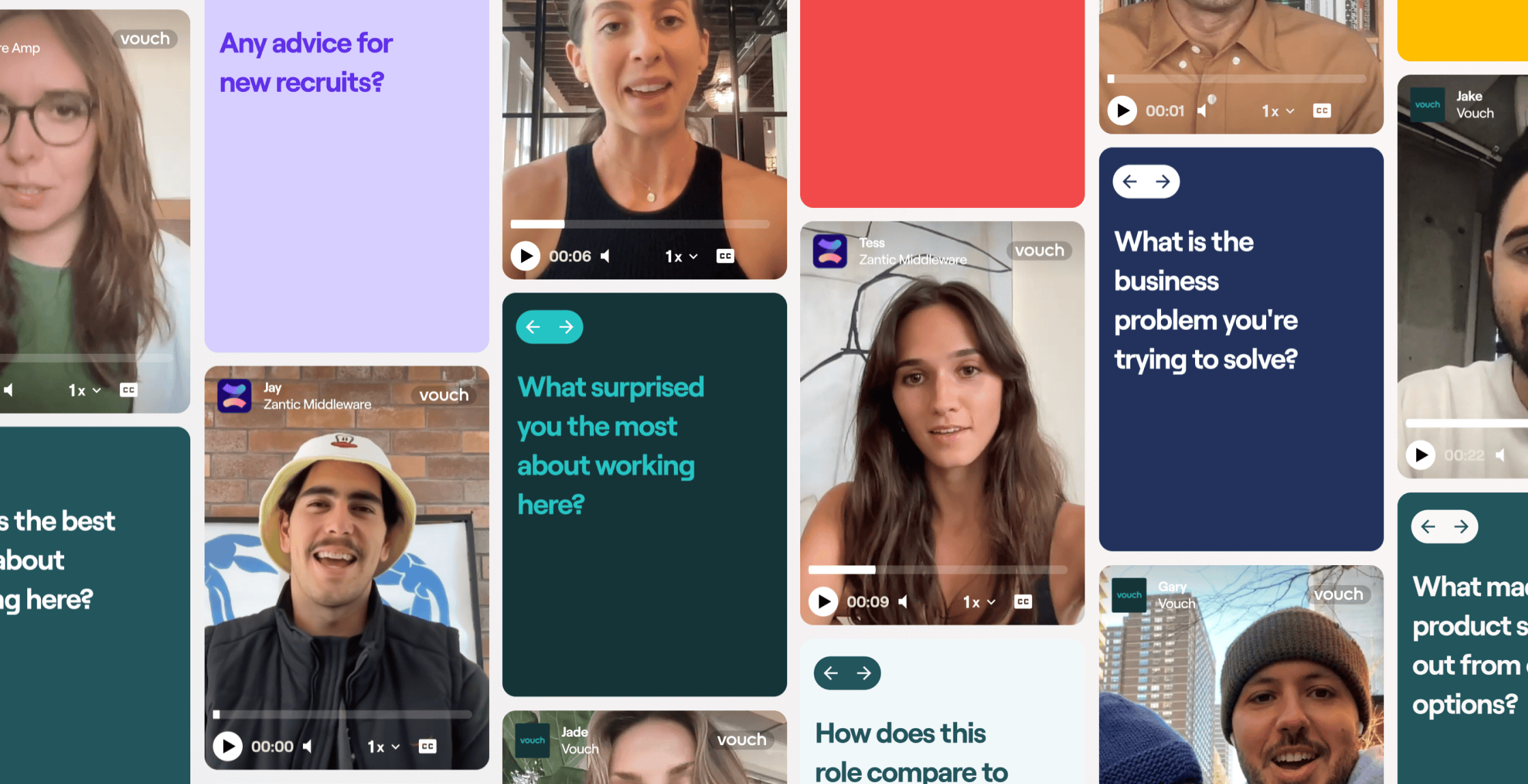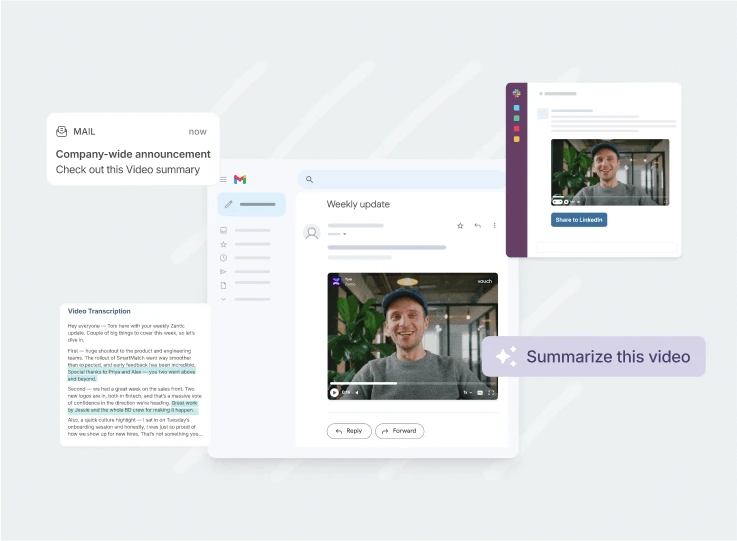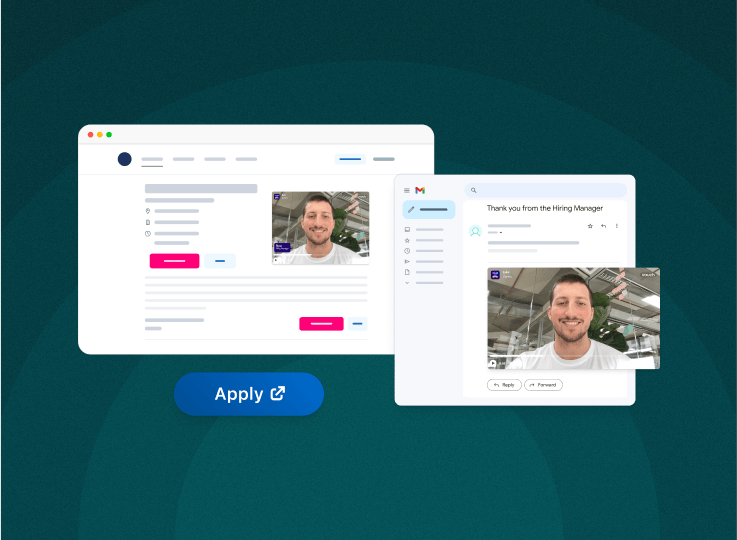Building a strong team is essential for every organization's short, and long-term success.
And while it's important to focus on work-related tasks and projects, we know it's equally important to build personal connections among team members to inspire and motivate them to do their best work. A strong, bonded team is a productive and happy team after all, and they help you attract the best talent through your employer brand.
This is where the below "get to know staff questions" for new employees are perfect.
By asking the right questions, you can create a positive and inclusive work environment that creates better teamwork and collaboration.
So let's get started and explore why "get to know staff questions" are so important.
Key Takeaways:
- "Get to know staff questions" can enhance team building efforts, especially with remote teams who don't get to have as much water cooler chat.
- Asking the right questions can improve teamwork and collaboration. This includes fun questions like favourite food or favourite famous person, to more serious life goal questions.
- "Get to know staff questions" can be used as icebreakers in the workplace and can also help in your recruitment process.
- "Get to know staff questions" are also perfect for building your Employer Brand, and this is where Vouch can help.
Why are "Get to Know Staff Questions" Important for Team Building?
As a member of a team, it is crucial to have a working relationship with your team and colleagues built on mutual trust and respect.
As a team leader or HR manager, or even a talent acquisition specialist, one way to achieve this is by using "get to know staff questions" as icebreakers to help you connect with your team members.
Icebreaker questions are a great way to break down barriers and get to know your team members on a personal level, so you can develop a stronger sense of camaraderie that can improve communication, collaboration, and ultimately, productivity.
"Get to know staff questions" can also be useful in identifying each team member's strengths, weaknesses and professional goals (a kind of SWOT analysis), which can help improve workflow and streamline processes.
15 Fun "Get to Know Staff Questions" to Break The Ice And Get To Know Someone At Work
The questions are great for new employees, to open up some fun chat. They are also great questions to ask to get to know someone at work, even if you have been colleaguse for years.
Some examples of "fun icebreaker" questions to start the chat can include the below - note how these questions help to build an understanding of your new employees and their thought process:
- What is a hobby or interest that you enjoy outside of work?
- What is your favorite food?
- What's the weirdest food you've eaten?
- What is your favourite song?
- What are your favourite bad or embarrassing songs?
- What is your biggest goal for this year?
- Where is your favorite place to visit?
- What is your favorite book or movie?
- Do you have any unique family traditions?
- Are you a dog person, or a cat person?
- What are your pet peeves?
- If you had a time machine, what year would you go to?
- What would your dream house look like?
- What was your worst haircut?
- Name 3-5 people you would invite to your dream dinner party?
Asking these types of questions can help you break the ice and start meaningful conversations with your team members.
Using these questions, you can get to know your colleagues beyond their job titles and responsibilities and build a stronger sense of unity within your team.
NOTE: These questions are also perfect for your recruitment process, especially remote and asynchronous interviews, to help the candidate open up and feel more comfortable with the more serious questions to follow. They are in essence, great ice breakers.
The AI-enabled workspace for talent teams.
- Unified workspace for talent teams
- Accelerate hiring with AI tools
- Auto-generate polished hiring and employer brand content
- Easily repurpose assets across all channel
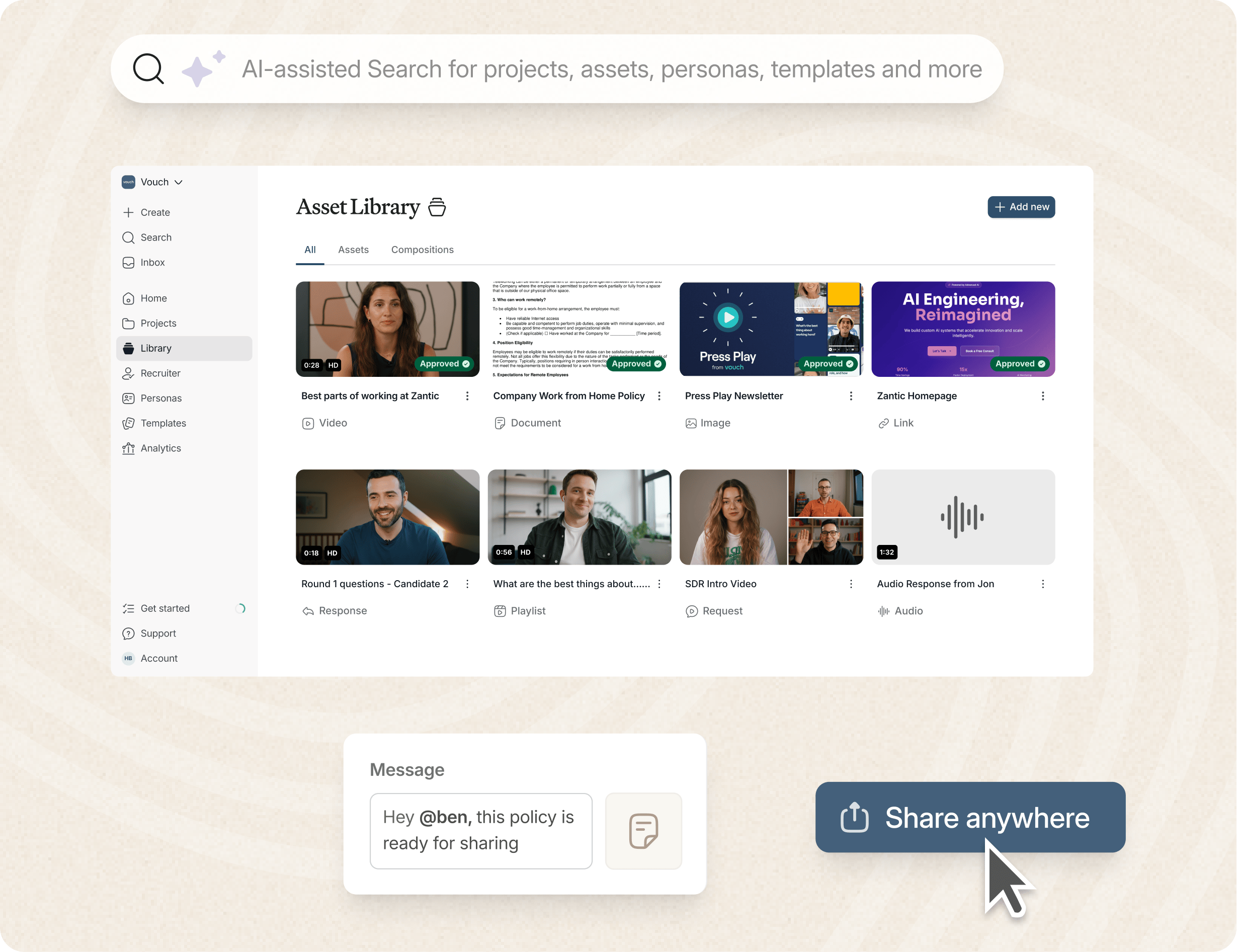
When to Use Icebreaker Questions at Work?
Icebreaker questions are great, but you need to know when to use them; otherwise it can appear to be awkward.
Here are some suggestions for when to ask icebreaker questions:
1) At the start of the first face-to-face or recorded job interview.
2) During the onboarding process, and this could even be in an initial team meeting so everyone gets to know the new person a little better. Just be sure that the questions are approved by your HR team.
3) During a team or social event, where you open the questions up to everyone to have a giggle and break the ice of the event.
4) Questions to ask during orientation for a job or new role within your company if you have people moving between departments etc.
Using icebreaker questions during these times can help team members feel more comfortable sharing their thoughts and ideas, increasing the likelihood of successful collaboration and innovation in the workplace.
3 More Serious "Get to Know Staff Questions" for Employees And Recruitment Interviews
Asking a few deeper questions is also important for getting to know an employee, and even in the hiring process if they are a strong candidate.
To help you get started, we've compiled three of the best questions to ask staff to create a sense of open communications and trust:
- "What was your first job, and what did you learn from it?"
- This question can give insight into a team member's work ethic and provide a starting point for conversation.
- "What is one thing you're passionate about that you don't get to do enough?"
- This question allows team members to share their personal goals and aspirations, ultimately building trust and understanding.
- "What is one thing you would like to learn or improve upon in your role?"
- This question can spark brainstorming sessions to help team members learn from each other and improve the overall workflow.
By incorporating these questions into your team building and recruitment processes, you can create a more open and inclusive work environment and encourage team members to work collaboratively towards shared goals.
Remember, building a strong team and your company culture can take time and effort, and the right questions. These three questions are a perfect springboard.
What Are Some Fun Questions To Ask Coworkers To Get To Know Them?
So far we've been looking at questions that managers or team leaders can ask candidates during the hiring process, new or current employees, but what about coworkers getting to know each other! This is where fun questions to ask coworkers to get to know them come into play.
These coworker questions are light hearted and personal, perfect for getting to know a colleague.
Here are 7 fun and lighthearted questions you can ask coworkers to get to know them better. Please just note, these are not work related:
- If you could have any superpower, what would it be and why?
- What’s your go-to karaoke song?
- What’s a TV show you can watch over and over without getting bored?
- What’s your favorite way to unwind after a long day?
- If you could instantly become an expert in anything, what would it be?
- If you could only eat one type of food for the rest of your life, what would it be?
- What’s the best concert or live performance you’ve ever been to?
These questions mix fun with personal insight, making them great for building rapport with coworkers and learning more about their interests and personality.
Just remember, these are not meant to be work questions, these are simply to open up the conversation and rapport to do amazing work together.
What Are 5 Statistics Around Onboarding New Employees And The Impact Of Getting To Know Someone Better At Work?
When it comes to get to know staff questions, the business benefits can be quite an eye opener, especially for companies who currently have high turnover. Getting to know candidates and employees can have benefits such as these stats highlight:
Effective onboarding can boost new-hire retention by 82%
A well-structured onboarding process has been shown to increase retention of new employees by up to 82%. This suggests that helping newcomers integrate socially and culturally (not just technically) plays a big role in whether they stick around.
In some industries, 33% of new hires leave within the first 90 days
Roughly one in three new employees quits within their first three months, often citing difficulties in adjustment, unclear expectations, or poor relational fit. This “honeymoon period” is critical: strong social connections formed early can help prevent early departures.
Only 12% of employees say their organization gets onboarding right
A Gallup-derived finding suggests that just 12% of new employees “strongly agree” that their company does a good job with onboarding. This indicates many organizations are missing opportunities, especially in the relational, “getting to know peers and mentors” area which is a problem you can easily solve with tools like Vouch.
Teams with high engagement show 59% lower turnover
Gallup research finds that highly engaged units experience 59 % less turnover in high-turnover settings than less engaged ones. Engagement is strongly correlated with relational factors - people are more likely to stay where they feel connected, respected, and known.
Engaged teams are often over 18% more productive
Studies show that teams with higher engagement outperform others by around 18% in productivity metrics. Being known, meaning valued, trusted and understood contributes to engagement, people who feel psychologically safe and included tend to perform better.
These data points highlight the crucial role that structured, supportive onboarding programs play in employee satisfaction, retention, and productivity. For more information, you can explore the sources further at AIHR, Appical, and Enboarder.
Who Are The Top 10 Companies In The World That Are Famous For Getting To Know Their Employees?
When we look at the top companies, there are some key practices they all share:
- Frequent Feedback Loops: Anonymous pulse surveys, manager 1-on-1s, and transparent leadership channels.
- Cultural Codification: Clear culture decks or codes that align everyone on values and behaviors.
- Data-Driven HR: Use of analytics to improve hiring, retention, team performance, and wellbeing.
- Autonomy & Flexibility: Empowerment models that let employees own their time, goals, and learning.
- Transparent Communication: Open discussions around company performance, strategy, and culture.
- They Care: There is no simply no substitute for this - when you care, your employees care back.
1. Google (Alphabet Inc.)
Why they're known for onboarding:
Google is famous for its data-driven HR practices (People Analytics). It pioneered initiatives like "Project Oxygen" and "Project Aristotle" to understand what makes great managers and effective teams. Google continually gathers employee feedback and uses it to shape policies, their employee advocacy, workspace design, and benefits.
2. Salesforce
Why they're known for onboarding:
Salesforce ranks consistently high for employee satisfaction. They invest heavily in culture, equality, and wellbeing through programs like “Ohana Culture,” employee surveys, and inclusive leadership training. Their internal platform, V2MOM (Vision, Values, Methods, Obstacles, and Measures), aligns individual roles with company goals.
3. Netflix
Why they're known for onboarding:
Netflix is a leader in transparency and high-performance culture. Their famous "Freedom and Responsibility" culture deck has influenced companies worldwide. They trust employees with autonomy and use direct feedback loops to maintain alignment without micromanagement.
4. Microsoft
Why they're known for onboarding:
Under Satya Nadella's leadership, Microsoft transformed its internal culture. Emphasis shifted to a “growth mindset,” empathy, and collaboration. The company uses ongoing listening systems (like the annual “MS Poll” and pulse surveys) to keep a finger on employee sentiment.
5. LinkedIn
Why they're known for onboarding:
LinkedIn’s “InDay” gives employees one day a month to focus on themselves, innovation, or giving back. They focus on employee purpose and use data to drive engagement. Their robust internal learning and feedback systems are core to their people-first strategy.
6. HubSpot
Why they're known for onboarding:
HubSpot built its culture on transparency, flexibility, and employee empowerment. Their Culture Code, published publicly, guides hiring and leadership. The company is open about metrics and encourages employee voice through frequent engagement surveys.
7. Zappos
Why they're known for onboarding:
Zappos is legendary for its quirky, people-focused culture. New hires go through extensive culture training. They’ve even offered new employees $2,000 to quit if they feel it’s not the right fit, a bold move to ensure alignment and mutual understanding.
8. Adobe
Why they're known for onboarding:
Adobe abolished formal performance reviews in favor of ongoing “check-ins.” This keeps managers in closer contact with employees’ goals and growth. They also use regular employee surveys to drive inclusion, wellbeing, and development strategies.
9. Spotify
Why they're known for onboarding:
Spotify is known for its “squad” organizational model, empowering small, cross-functional teams. Their “Spotify Rhythm” includes regular surveys, skip-level meetings, and HR check-ins to ensure leadership stays connected with employees’ experiences.
10. Cisco
Why they're known for onboarding:
Cisco uses a robust listening strategy with real-time feedback tools and quarterly check-ins to understand employee engagement and build their employer brand. The “People Deal” (Cisco’s cultural manifesto) defines mutual commitments between employees and the company.
FAQs
What are "get to know staff questions"?
"Get to know staff questions" are questions that are designed to help team members learn more about each other on a personal and professional level. These questions encourage open communication, create stronger relationships, and promote team building. They are similar to spotlight questions, but with spotlight videos these are usally for established team members not new employees.
How can "get to know staff questions" be used as icebreakers for work?
"Get to know staff questions" can be used as icebreakers in the workplace to break down barriers and encourage open conversation. These questions can be used during team meetings, training sessions, or social events to create a more relaxed and enjoyable work environment.
Why are "get to know staff questions" important for team building?
"Get to know staff questions" are important for team building because they provide an opportunity for team members to connect on a deeper level. By asking these questions, team leaders can create a more inclusive and collaborative work environment, leading to better teamwork and improved productivity.
What are some essential "get to know staff questions" for team bonding?
Some essential "get to know staff questions" for team bonding include asking about personal interests, hobbies, career aspirations, and strengths. These questions allow team members to share more about themselves, learn from each other, and build stronger bonds within the team. These questions are ideal for your annual company retreat and questions to ask to get to know someone at work no matter if they are a new employee, or been with you for years.
How can implementing "get to know staff questions" improve workflow?
Implementing "get to know staff questions" can improve workflow by creating opportunities for team members to understand each other's strengths, weaknesses, and working styles. This understanding can optimize collaboration, streamline processes, and enhance overall productivity.
How can I get to know my colleagues better in a professional setting?
Building strong relationships with colleagues starts with open communication and genuine interest, which is where employee spotlight videos can help. It's also important to engage in casual conversations, participate in team activities, and take the initiative to ask about their experiences, interests, and roles within the company.
Conclusion
Using the simple "get to know staff questions" provided in this article can significantly help create team bonding and create opportunities for team members to learn from and support each other.
Implement these questions as icebreakers during team meetings, training sessions, or social events, and watch as your team flourishes with improved camaraderie and workflow. These getting to know staff questions is also ideal in your recruitment process and when it comes to building your employer brand.
Get To Better Know Your Staff With Vouch!
Loved by companies like Canva, Nike, Cisco, HubSpot, Amazon and more, tools like Vouch make leveraging video and more personal communications in your business remarkably easy.
Be sure to book a Vouch demo today and chat with a video content expert.
You might also like

Elevate Your Brand Today With Vouch
Discover how Vouch can accelerate talent acquisition while helping you stay on-brand.

